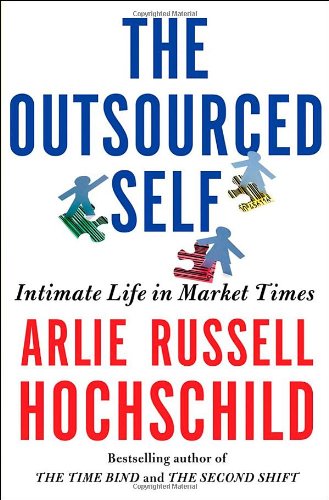The Outsourced Self: Intimate Life in Market Times By: Arlie Russell Hochschild (Metropolitan Books, 2012)

Arlie Hochschild, a sociologist at the University of California at Berkeley, has given us another book on her well-known themes of the inner life, the public world of the market place, and the relationship between the two. Though she tries to be balanced in her approach and conclusions, the picture she paints is not a pretty one. The book reminds one of the Spring, 2003, edition of The Hedgehog Review (the journal of the Institute for Advanced Studies in Culture) entitled “The Commodification of Everything”. Hochschild adds a lot of evidence for how true the dire prediction embedded in that title is becoming.
The Outsourced Self is written in an accessible style, beginning with stories from the author’s own experience growing up as the child of diplomats who lived all over the world. She compares the life situations of her parents and herself to those of one set of her relatives, who lived almost all their lives in the small town of Turner, Maine. There her grandparents and assorted aunts and uncles lived in a community, which Hochschild visited every summer. She describes Turner as an almost idyllic culture of borrowed cups of sugar, neighbors watching each other’s backs and shared experiences of all kinds, all freely received and freely given.
In contrast the present market-driven, alienated and alienating culture of pre-packaged, advertised, mass-produced articles has now pushed its way into the way Americans handle the search for anything we need, no matter how intimate, no matter how interior. As Hochschild puts it: “The market is now present in our bedrooms, at our breakfast tables, in our love lives, in our deepest joys and sorrows. And the more the market is the main game in town, the more hooked we get on what it sells, and the more convinced that paid expertise is what we lack and an even larger service mall is the only way to go.”
In The Outsourced Self, Hochschild devotes chapters to some services with which we are all familiar. Particularly prominent is a thorough examination of eHarmony, Matchmakers.com and other on-line dating services. In a section entitled “A Booming Love Business”, the author informs us that fully one out of six new marriages involves a couple who first met through an Internet dating site. The industry itself calls the more traditional meeting methods—work-related meetings, bars, parties, social or church events—“off-line dates” or even “dating in the wild”. Key to an understanding of the competing philosophies underlying the two methods of meeting people is the involvement and trust of “science” in the one and “mystery” in the other. On-line services offer a plethora of detail and data that they use to match a client up with “compatible” people; other methods rely more fully on whatever might happen between two people in an unplanned context.
This distinction tracks throughout the book without Hochschild ever really focusing on it. The point is that more and more services are appearing that seem to be displacing human choice based on anything other than “fact” or “evidence”, and responsibilities that used to be associated with family or neighborly roles are being given over to “experts”. Wet nurses have morphed into child consultants, responsible not only for child care during working hours, but for buying clothes, teaching a child to ride a bike and even selecting the appropriate summer camp for the child. Choices that used to be made based on communities of family, neighborhood or work are now being outsourced to “consultants” in everything from clothes and style to baby names. A “nameologist” helps the client with that one, claiming that a name “designs the child’s personality” and that “applying ‘the energetic science of names’ could stave off a newborn’s unhappy future.” One can also hire a “rent-a-friend” or even a “rent-a-dad”.
Though the book is mostly a strong advocate against the notions of market, and expertise defining our social and interior life, it is not entirely so. After describing in her last chapter the work of a “wantologist” (you guessed it: this person helps you discover what you really want, not just what you think you want…), Hochschild returns to the story of her aunt Elizabeth in Turner. After pursuing many different avenues for taking care of her aging, obstreperous aunt, Hochschild finally found a paid caregiver to accompany her, take care of her, and, yes, become her friend. According to Hochschild, the young woman made her Aunt Elizabeth’s last years some of her richest and happiest.
A book for discussing the importance of choice, human responsibility and balanced, “long” living, The Outsourced Self helps us to think even more broadly about the ways in which our society defines our “self” without us even realizing it.
Drew Trotter